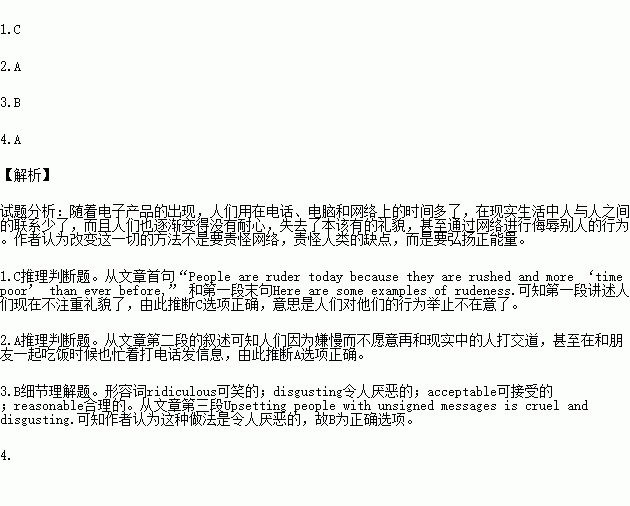题目内容
“People are ruder today because they are rushed and more ‘time poor’ than ever before,” says Patsy Rowe, “Manners_have_fallen_off_the_radar(雷达).” Due to our strong attraction to electronic equipment it is a wonder more people don't wake up each morning and greet the singing birds with a complaint(抱怨)about the noise. Here are some examples of rudeness.
Some people prefer to do almost everything over the Internet. To them, dealing with an actual human needs more patience. It feels very slow because humans don't work at 4G speeds. When you have dinner with friends, you will often notice someone paying more attention to his mobile phone. We have programmed ourselves to think that every new message brings life-changing news, so taking calls and checking our texts are more important than talking to the people we are with. What is worse, some people even tend to send anonymous(匿名的) rude messages by email.
However, rudeness is never acceptable. Don't assume it is OK to be rude if the person you're in touch with won't recognize you. If you have something awful to say, have the courage to face the person and say it, write a letter or email and sign it, or forget it. Upsetting people with unsigned messages is cruel and disgusting.(令人厌恶的)
We shouldn't blame technology for our shortcomings. Technology is here to help us,but we should not allow it to take over our lives. An important step is acknowledging our shortcomings. People spend a lot of time pointing out bad manners but it would be even more helpful if we'd publicly acknowledge good manners when we see them.
1.What can be inferred from the underlined sentence in Paragraph 1?
A.People can tell good from bad behavior.
B.Radar is able to observe human behavior.
C.People care little about their behavior.
D.Radar can be used to predict human behavior.
2.Some people are less willing to deal with humans because ________.
A.they are becoming less patient
B.they are growing too independent
C.they have to handle many important messages
D.they have to follow an evolutionary step backward
3.The author thinks sending unsigned awful messages is ________.
A.ridiculous
B.disgusting
C.acceptable
D.reasonable
4.What can we learn from the last paragraph?
A.We should applaud (为喝彩) good behavior.
B.Technology can never be blamed.
C.We should keep pointing out mistakes.
D.Technology will take over our lives one day.
 金博士一点全通系列答案
金博士一点全通系列答案
